|
|
|
Sort Order |
|
|
|
Items / Page
|
|
|
|
|
|
|
| Srl | Item |
| 1 |
ID:
150490
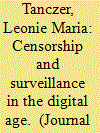

|
|
|
|
|
| Summary/Abstract |
The “Snowden leaks” and censorship methods used during the Arab Spring have brought warranted attention to technologically supported censorship and surveillance (Bauman et al. 2014; Deibert and Crete-Nishihata 2012, 344). The public is now aware how digital tools and information are prone to tracing, interception, and suppression. Processes of eavesdropping and information collection (i.e., surveillance) are often interrelated with processes of removal, displacement, and restriction of material or speech (i.e., censorship). Both are often enshrouded in secrecy, leaving censorship and surveillance techniques open to abuses (Setty 2015).
|
|
|
|
|
|
|
|
|
|
|
|
|
|
|
|
| 2 |
ID:
150482
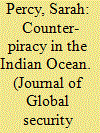

|
|
|
|
|
| Summary/Abstract |
This article examines how a group of loosely connected, often adversarial states have managed to conduct successful counter-piracy operations off the coast of Somalia. The traditional literature on multinational military cooperation assumes that such cooperation will be successful when it is hierarchically organized with a strong central command and unity of action. Counter-piracy has functioned well because it takes a fundamentally different, networked form. Counter-piracy operations are egalitarian, rather than hierarchical, and operate using informal links between militaries. This article considers the implications of informal military cooperation, and the extent to which lessons from counter-piracy can be applied elsewhere.
|
|
|
|
|
|
|
|
|
|
|
|
|
|
|
|
| 3 |
ID:
150481
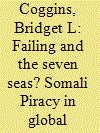

|
|
|
|
|
| Summary/Abstract |
This article reconciles the conflicting evidence on the relationship between governance and maritime piracy at the macro (state) and micro (sub-state) level using original data (2000–2011) and a study of piracy’s emergence in and around the Horn of Africa. It finds a consistent, positive relationship between state weakness and increased piracy production cross-nationally. However, Somali piracy belies the “anarchy as opportunity” mechanism implied by the large-N study. The pirate industry there received substantial support from local authorities, more consistent with a quadratic, “stability-enabled” argument regarding governance. I conclude that each is half-right. At the macro level, anarchy presents permissive conditions for simple banditry, but limits the potential for robust organized crime unless corruptible sub-state authorities exist and can be co-opted. Policy-wise, efficient pirate deterrence programs should concentrate on regions within failed states with this mix of characteristics. Methodologically, the results point to the limitations of existing metrics of state fragility and governance, and recommend that more nuanced measures be used.
|
|
|
|
|
|
|
|
|
|
|
|
|
|
|
|
| 4 |
ID:
150486
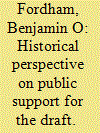

|
|
|
|
|
| Summary/Abstract |
The military draft was once an important element of American national security policy with widespread popular backing. The collapse in public support for it is an important historical puzzle. Public opinion about the draft also offers an arena for assessing the role of war costs, such as military casualties, in shaping attitudes toward national security policy. The costs of the draft fall on a readily identifiable segment of the population. However, surveys administered during several different historical periods provide only limited evidence that these costs affect individual opinion. Draft eligibility reduced support for conscription during peacetime but not during major wars, when the cost of being drafted was greatest. By contrast, military service had a more consistent socializing effect, with veterans and their families expressing greater support for the draft. Together, these and other individual-level processes suggest a possible explanation for the decline in aggregate support for conscription that has more to do with changing force structure and elite leadership than with public aversion to the costs of war. The results also suggest that war costs have more complicated effects on public opinion than most research on public support for war implies.
|
|
|
|
|
|
|
|
|
|
|
|
|
|
|
|
| 5 |
ID:
150487


|
|
|
|
|
| Summary/Abstract |
The idea to organize a forum on censorship—the control of information and ideas circulated within a society through the suppression of words and images—emerged among the editorial team in summer 2015. In July, the founder of WikiLeaks, Julian Assange, gave an interview to the German news magazine Der Spiegel in which he suggested that English-speaking IR scholars are reluctant to use material made public by WikiLeaks for their research (Assange 2015).
|
|
|
|
|
|
|
|
|
|
|
|
|
|
|
|
| 6 |
ID:
150488


|
|
|
|
|
| Summary/Abstract |
Security studies scholarship on nuclear weapons is particularly prone to self-censorship.1 In this essay, I argue that this self-censorship is problematic. The vulnerability, secrecy, and limits to accountability created by nuclear weapons (Deudney 2007, 256–57; Born, Gill, and Hânggi 2010; Cohen 2010, 147) call for responsible scholarship vis-à-vis the general public. This need for renewed and expanded scholarly responsibility is especially pressing given current plans among nuclear-weapon states to “modernize” their nuclear arsenals, committing their citizens and children to live in nuclear-armed countries and, a fortiori, a nuclear armed world (Mecklin 2015). Despite this need, the existing reflexive literature in security studies—calling for greater scholarly responsibility (see Steele and Amoureux 2016; Waever 2015, 95–100)—has neither specifically focused on nuclear weapons nor explored the forms of self-censorship identified here as shaping a modality of responsibility. In making this case, I define self-censorship in nuclear weapons scholarship as unnecessary boundaries on scholarly discourse within security studies.
|
|
|
|
|
|
|
|
|
|
|
|
|
|
|
|
| 7 |
ID:
150489
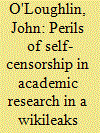

|
|
|
|
|
| Summary/Abstract |
For the past six years, the availability of WikiLeaks data—including the SIGACTS violent event data for Afghanistan and Iraq as well as the diplomatic cables—has posed an important challenge for international relations and conflict researchers. Despite the evident attractions of the vast trove of primary data involving US military and diplomatic interests, only a few peer-reviewed academic papers have been published. The reluctance to analyze WikiLeaked information is mostly due to self-censorship. Because of its character, we cannot reliably know why American academics engage in self-censoring, but worries about repercussions for career prospects or fear of prosecution are probable. Despite threats of legal consequences by governmental officials, none have occurred (to my knowledge). Academics who have publicly spurned analysis of WikiLeaks information have made two arguments, either a) that it is against US law to access the data and/or that it helps America’s enemies or b) that the materials in the leaks are not worthy of much attention since they are not earth-shattering or unexpected. Neither of these claims holds much validity.
|
|
|
|
|
|
|
|
|
|
|
|
|
|
|
|
| 8 |
ID:
150479
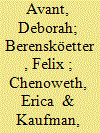

|
|
|
|
|
| Summary/Abstract |
The final issue of JoGSS’ first volume begins with paired articles on piracy and ends with a forum on censorship. These bracket an innovative argument about the importance of first impressions for threat perception and a careful empirical analysis of why support for the draft in the United States has waned. The articles in this issue showcase a wide variety of methods, many different theoretical starting points, and engage both contemporary and historical issues.
|
|
|
|
|
|
|
|
|
|
|
|
|
|
|
|
| 9 |
ID:
150491
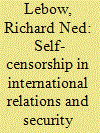

|
|
|
| 10 |
ID:
150484
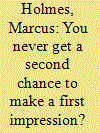

|
|
|
|
|
| Summary/Abstract |
A common assumption in international relations (IR) theory is that threat perception involves the very deliberate and painstaking task of processing information. Costly signals, movements toward rapprochement, conciliatory gestures, speech acts, intentioned behavior, and other actions are interpreted and consciously analyzed in order to answer the simple question: Does the relevant actor pose a threat? Yet, a wealth of evidence from psychology and neuroscience suggests that rather than consciously evaluating others, we tend to make quick judgments within milliseconds of meeting. First impressions, it turns out, are critical to judgments of threat as well as trustworthiness. And crucially, first impressions are sticky in that they last long into a relationship and color future interactions. This article elaborates this cognitive bias in IR threat perception, posits a theory of first impressions at the individual level of analysis, and outlines its importance in diplomacy. In particular, I connect the literature on first impressions to the problem of first encounters in constructivist theorizing, suggest links to the proliferation of symbolic violence, and find an antidote to symbolic violence in the practice of digital diplomacy.
|
|
|
|
|
|
|
|
|
|
|
|
|
|
|
|
|
|
|
|
|